4 Unhealthiest And 4 Healthiest Store-Bought Microwave Popcorn

Popcorn is a delicious and fun snack that many equate with social events. According to the American Heart Association, it can also be a healthy and cost-effective one. Delicately seasoned, air-popped popcorn is a fiber-loaded, polyphenol-rich whole grain that has been associated with lowering the risk of cardiovascular disease, diabetes, and certain types of cancer. And, while store-bought microwave popcorns have in the past gotten a bad rap for containing potentially toxic chemicals, known as PFAS or perfluorochemicals, many brands have made a concerted effort to minimize or eliminate these.
This is all great news for popcorn lovers. Though freshly air-popped popcorn is not all that difficult to make, store-bought microwaveable packs are quick and require less clean-up. That said, there are a few considerations to keep in mind when purchasing the microwavable variety. Many can be high in saturated fat, sodium, and may contain artificial ingredients or additives, like food dyes, that in excess can be unhealthy.
For this reason, it is important to pay attention to nutrition labels on store-bought popcorn brands, scouring for excessive ingredient lists and noting portion sizes carefully, something that I took the initiative to do. I evaluated a majority of popcorn brands and products to determine the healthiest and unhealthiest options from some of the top ones based on criteria I will outline at the end of this article. For now, read on to find out which product you should purchase to make your next batch of mac and cheese popcorn, and which you should skip.
Read more: 7 Butter Brands You Should Buy, And 7 You Shouldn't
Unhealthiest: Act II Hot & Spicy
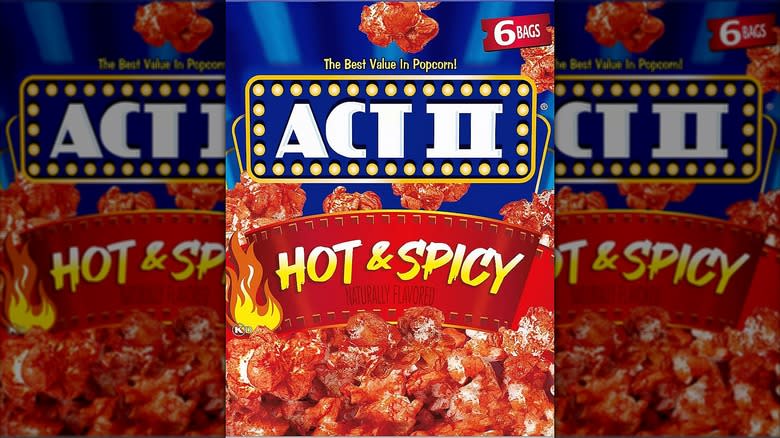
The least healthy offering from Act II is its Hot & Spicy variety. This product is geared toward those who love some serious heat, though the amount of palm oil contained in this popcorn is not likely to help tame the capsaicin that will linger on your tongue after you consume it. It is, however, one of the factors contributing to the less than stellar nutritional profile of this popcorn. It may also be of concern to those worried about the sustainability of and potential ethical concerns surrounding the production of this fat, which has been well documented by the U.S. Department of Labor.
This popcorn contains 270 calories per package. Each package has 8 grams of saturated fat, a whopping 40% DV, and 960 milligrams of sodium, which is 42% of the recommended daily value, both of which are considered high according to the FDA. This product also contains a number of artificial ingredients, including TBHQ, or Tert-butyl hydroquinone, a preservative, which, when consumed long-term or in excess may pose health risks, according to a study in Toxicology Reports. Lastly, this product includes two food dyes, Red 40 Lake and Yellow 6 Lake, which have been implicated with adverse behavioral impacts on children by a number of research studies.
Healthiest: Act II 94% Fat Free Butter
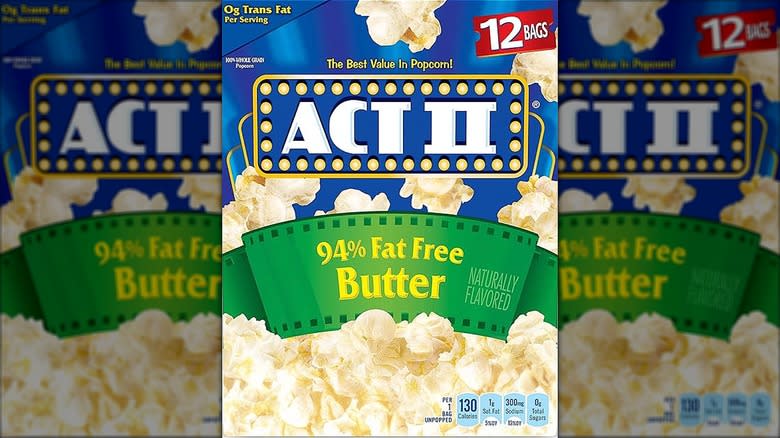
While it too contains palm oil and TBHQ, the 94% Fat Free Butter variety from Act II is definitely an improvement nutritionally. Each serving of this product has 130 calories, just 1 gram of saturated fat (5% DV), and 300 milligrams of sodium (13% DV). The only hitch is that each bag contains 2 servings, so you will have to exert some restraint and not consume the whole thing in one sitting, though even if you did, you wouldn't be too poorly off, overall.
A close second place would be the Light Butter variety, which also contains 2 servings per package. With 140 calories, an identical 1 gram of saturated fat (4% DV), and 420 milligrams of sodium (18% DV), this is not far behind nutritionally. I mention this because the former is listed under the "Better For You" category, while the latter can be found under "Buttery Favorites." When you begin to really analyze the details on nutrition labels, you will often find that the "health halo effect" can be a powerful influence in shaping your purchasing decisions. That said, if you do need to follow a low-sodium diet, the 94% Fat Free Butter variety is definitely preferable.
Unhealthiest: Orville Redenbacher's Ultimate Butter

Orville Redenbacher's has a variety of microwave popcorn options. Among them, the Ultimate Butter flavor ranks at the bottom of the list in terms of nutrition in the full-size package department. Each serving contains 170 calories, 6 grams of saturated fat, which is a hefty 30% of the recommended daily value, and 450 milligrams of sodium (20% DV). Each bag contains 2.5 servings, and the popcorn is made using palm oil. Since portion size is a relative concept, with many of us polishing off a full bag in one sitting, that saturated fat and sodium can quickly add up.
If you think you will be doing yourself a favor by purchasing mini bags of popcorn, you may want to rethink that perception. Many mini bags are equally as unhealthy, even if they seem like a better option in terms of portion-size. The Movie Theater Butter Mini Bags, for example, contain 210 calories per bag, with 7 grams of saturated fat, 35% DV, and 500 milligrams of sodium, which is 22% of the recommended daily value. This is still excessive and may give people a false sense of security in thinking they are making better choices for their health simply based on serving size.
Healthiest: Orville Redenbacher's Smartpop! Butter

Fortunately, Orville Redenbacher's has other options for those seeking healthier popcorn, in both full- and mini-size varieties. Its Smartpop! Butter line is far more well-balanced nutritionally. Each full-size bag contains 2 servings. There are 120 calories, 0.5 grams of saturated fat, and only 340 milligrams of sodium per serving. The mini bags are even more promising, with each bag containing just 100 calories, 0.5 grams of saturated fat, and 310 milligrams of sodium. And if you really want to limit sodium, the Smartpop! Kettle Corn Mini Bags are even more consumer-friendly, with just 170 milligrams per serving.
While Orville Redenbacher co-created the Skinnygirl popcorn line, when comparing the nutrition of this "healthy" alternative to the Smartpop! line, I was struck by what I saw. It is actually higher in fat and sodium even though it gets lauded as the more sensible option with a "lighter twist." Its Butter & Sea Salt mini bags contain 160 calories per serving, with 2.5 grams of saturated fat, and 400 milligrams of sodium. These are technically below the 20% DV threshold established by the FDA as high, but are still more than the Smartpop! Mini Bags in both the butter and the extra-crunchy kettle corn iterations. Again, this is a good reminder that clever advertising and a title that contains the term "skinny" in it doesn't necessarily equate with "healthier."
Unhealthiest: Pop Secret Sweet 'N Crunchy Kettle Corn
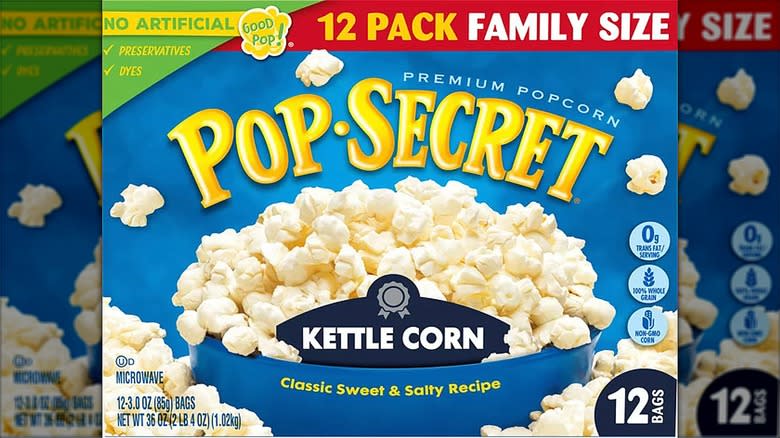
Kettle corn is a popular treat for those seeking a contrast in sweet and savory flavors as well as a more toothsome texture. That said, the extra flavor and texture can come at a cost, typically in the sugar and fat departments. When it comes to the Pop Secret Sweet 'N Crunchy variety, the sugar content is not an issue, but the saturated fat is, with 6 grams per serving, which is 30% of the recommended daily value. And each bag contains 2 servings.
Additionally, the ingredients list may be of some concern. This popcorn contains both natural and artificial ingredients, and is made with soy, which can be problematic for those with allergies. And if you are wondering how this popcorn obtains some of its sweet flavor without sugar, one answer is sucralose, an artificial sweetener that has been linked with a number of potential health issues, ranging from metabolic disruptions to altering the gut microbiome. And, some studies have indicated that, when heated, as it would be in popcorn, sucralose may degrade into chlorinated compounds, which are considered likely toxic carcinogens, according to Food Chemistry.
Healthiest: Pop Secret 94% Fat Free Butter

Though it may not quite satisfy your sweet tooth the way kettle corn will, a better-for-you alternative within the Pop Secret family of products is the 94% Fat Free Butter variety. This popcorn is just 100 calories per serving, contains no saturated fat, and has only 270 milligrams of sodium, which is 11% of the recommended daily value. Each bag contains three servings, though so watch your portion size if you are monitoring sodium intake.
This product does indicate both natural and artificial flavors on the ingredients list, which may be of concern to some consumers. That said, it is important to recognize that while the term "natural" may sound like it is safer and healthier, this might not be the case. When it comes to food labels, natural additives are not regulated and may be made from virtually anything. If you are hoping to ensure that a product is manufactured according to strictly regulated food laws, you are better off purchasing one that is certified organic.
Unhealthiest: Cousin Willie's White Cheddar

Though they may not be the biggest, most well-known microwave popcorn brand out there, Cousin Willie's has been perfecting the art of making popcorn since 1944. This family-owned midwestern brand evokes a sense of nostalgia with its brightly-colored, carnival-like packaging. And, while many of its flavors would fit under the umbrella of better-for-you, the White Cheddar variety is not one of them. Each serving contains 150 calories, 4 grams of saturated fat, which is 20% of the recommended daily value, and 490 milligrams of sodium (21% DV). Each bag has 2.5 servings.
Other concerns may include the palm oil, artificial white cheddar cheese flavor, and soy lecithin listed among the ingredients. Lecithins are fats that can be obtained from a number of different sources. These are a common food additive that can help emulsify, bind, and extend the shelf-life of various foods. Though generally recognized as safe (GRAS), when made from soy, which is one of the top major food allergens, it may be problematic for those with sensitivities, intolerances, or allergies, particularly if consumed in excess.
Healthiest: Cousin Willie's Kettle Corn
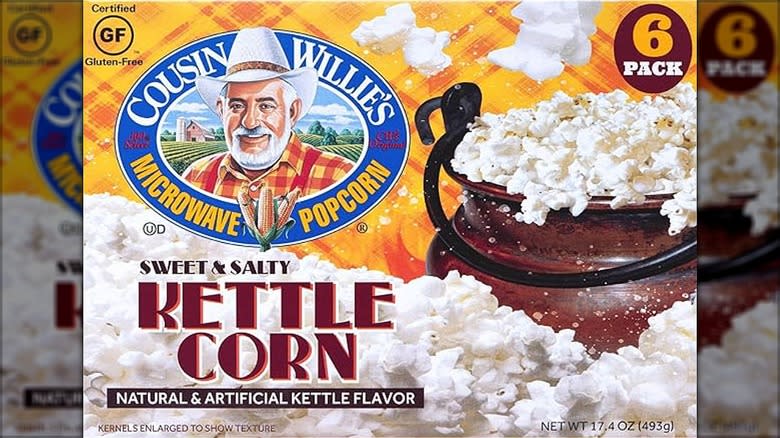
Among the funky, festive flavors Cousin Willie's brand offers, the Kettle Corn may be the best bet for the health-conscious consumer. Each serving has 140 calories, 3.5 grams of saturated fat, and 130 milligrams of sodium, all of which are below the 20% DV threshold dictated by the FDA. Again, there are 2.5 servings per bag, but even if you ate the whole bag, you would still be doing well in the sodium department, something I cannot say about most of the other store-bought microwave popcorn varieties on the market.
This product does contain some artificial flavors, soy lecithin, and sucralose. As I have already noted, artificial flavors may or may not be problematic depending on the consumer. Likewise for the soy lecithin, which will impact those with soy allergies, but should be safe for a majority of others. When it comes to sucralose, moderation may be the key here. The Cousin Willie's brand makes it clear that its popcorn is enough to share. Having a delicious treat on occasion while enjoying the company of others is just as much a part of a healthy lifestyle as what you are consuming. Indeed, there is plenty of research supporting the mental health benefits of enjoying food with friends and loved ones, including stress reduction and improving a sense of belonging. When it comes to a holistic approach to health, sharing is truly caring.
Methodology
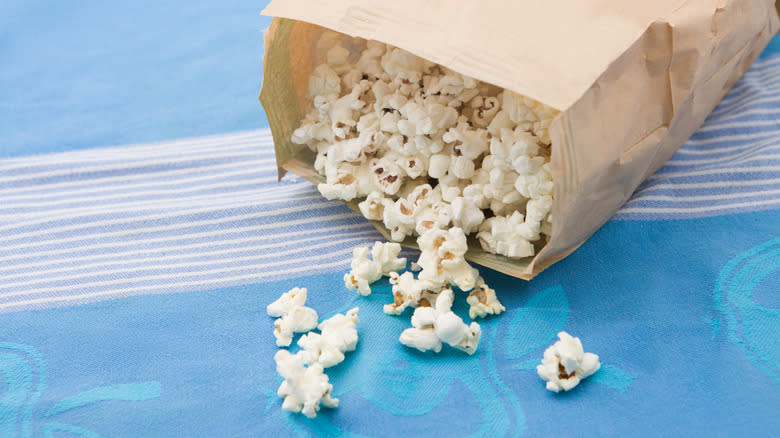
In determining the unhealthiest and healthiest store-bought microwave popcorn on the market, I began by establishing the criteria for what is or is not considered healthy. My baseline for the nutrition follows the FDA definition of what is considered to be high in terms of saturated fat, sodium, or sugar, which is 20% of the recommended daily value or more. I stuck with those brands that qualified in more than one category as high based on a single serving size. I did note, where applicable, where a bag contains multiple servings, paying particular attention to differences between full size and mini bags.
The second factor I considered were the ingredients. The simpler the ingredients list, the better. Where I saw specific standout items that may or may not be of concern, I mentioned them, especially where food additives, dyes, and preservatives were concerned. In some instances I also noted potential allergens, as there are more individuals identifying with one or more food sensitivities or intolerances.
Ultimately, this article is meant to be informative, not punitive. Food should be fun and there is a time and place to splurge. That said, if you are searching for a quick snack that qualifies as essentially healthy, I hope that my scouring and cross-referencing the ingredients lists of popcorn brands will help you to narrow down your search, making how to pop the fluffiest popcorn and determining if there is a correct side to lay the bag in the microwave the only concerns you will be left with.
Read the original article on The Daily Meal


